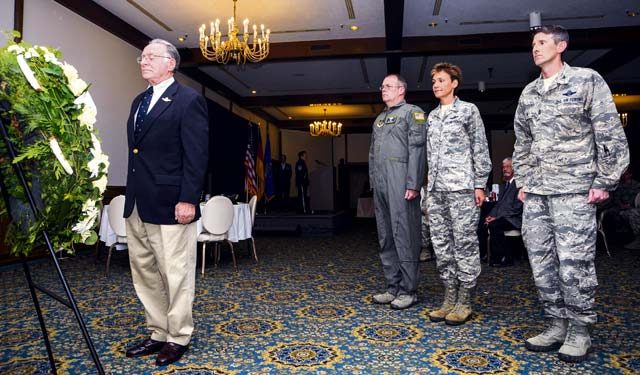
Retired U.S. Air Force Lt. Col. Melvin Pollack stands in silence before a wreath during a ceremony on National POW/MIA Recognition Day Sept. 16 on Ramstein. Pollack was joined by Brig. Gen. Richard G. Moore Jr., 86th Airlift Wing commander (left), Col. Andra Kniep, 435th Air Ground Operations Wing and 435th Air Expeditionary Wing commander (center), and Col. Bradley Cooper, 521st Air Mobility Operations Wing vice commander, in laying the wreath.
“I may be older, but I’m a fighter pilot,” he said, smiling, as he shared his story of perseverance before a crowd of Kisling NCO Academy students Sept. 12 on Kapaun.
Retired Air Force Lt. Col. Melvin Pollack, Vietnam War veteran, was flying his 78th mission when he was shot down and captured approximately 50 miles north of Hanoi, Vietnam, July 6, 1967.
Even though his ordeal as a prisoner of war was nearly fifty years ago, Pollack vividly remembers the details.
“I slammed into a mountain … so hard my head snapped back and cracked my helmet,” Pollack said. “The villagers came, probably 30 or 35 of them. What’s interesting is just about every single (enemy combatant), including the kids, were armed to the teeth. There I am on the ground and (their weapons) all pointed at me.”
The villagers detained Pollack until the militia came and brought him to Hanoi, where he was kept in a former French prison.
For the next five years and eight months, Pollack found himself locked up, isolated from the outside world, far away from home and under the watchful eye of his captors.
Besides the isolation and degrading treatment they went through, Pollack and his fellow prisoners were also subject to torture, interrogation and brainwashing. North Vietnamese captors also found out details about their personal lives, Pollack said.
“You never knew what to expect,” Pollack said. “I was a young first lieutenant. … Yet they knew everything about me. They knew I was young, I was single and (even) where I came from.”
Pollack said the mutual support and communication between prisoners are some of the things that enabled him to persevere even within the confines of the prison camp.
“We’d use our brain,” Pollack said. “We’d teach each other different things and learn different things. We were always thinking. … And that’s how we survived.”
Pollack also stressed the importance of adhering to the Code of Conduct, narrating the story of a fellow prisoner who stuck to the code even in the face of brutal treatment.
“He was a young Navy lieutenant who was really beat up badly, and I was a young Air Force lieutenant trying to survive,” Pollack recalled. “When you have nothing else going for you, thinking about the Code of Conduct and how you would behave … is most important.”
Pollack was eventually released March 4, 1973. He continued his career in the Air Force and eventually became a lieutenant colonel.
“What I found out the hard way … in getting shot down was that the stuff you learn in the schools you go to will come in handy, especially in times of adversity,” Pollack recalled.
Tech. Sgt. Gregory Hobbs, Kisling NCOA instructor, appreciated Pollack taking the time to come to the Kisling NCOA to share his story with the students.
“To be captured, beaten and to go through some form of torture and still remain loyal, I think that’s amazing,” Hobbs said. “Not folding, staying strong under pressure, keeping my military bearing and not giving them what they want, that would probably be my biggest takeaway.”
As Pollack concluded his talk, he encouraged the students to persevere even when faced with adversity.
“Never ever give up, and everything else will fall into place,” Pollack said. “That’s the number one lesson.”


